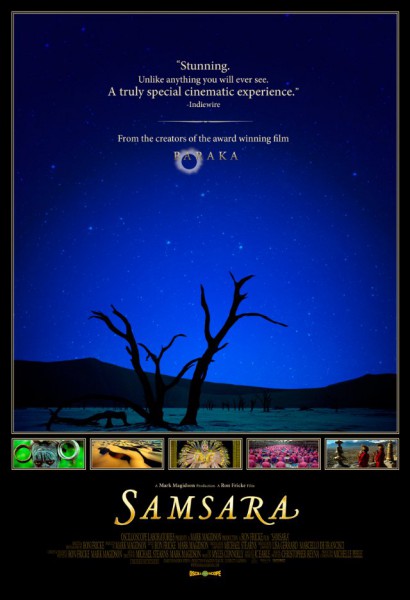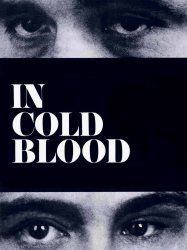Samsara is a american film of genre Drama directed by Ron Fricke released in USA on 22 august 2012
Samsara (2011)

If you like this film, let us know!
- Infos
- Casting
- Technical infos
- Photos
- Videos
- Film quotes
- Characters
- Music
- Awards
Samsara is a 2011 non-narrative documentary film, directed by Ron Fricke and produced by Mark Magidson, who also collaborated on Baraka (1992), a film of a similar vein. Samsara was filmed over five years in 25 countries around the world. It was shot in 70 mm format and output to digital format. The film premiered at the 2011 Toronto International Film Festival and received a limited release in August 2012.
Synopsis
The official website describes the film, "Expanding on the themes they developed in Baraka (1992) and Chronos (1985), Samsara explores the wonders of our world from the mundane to the miraculous, looking into the unfathomable reaches of humanity's spirituality and the human experience. Neither a traditional documentary nor a travelogue, Samsara takes the form of a nonverbal, guided meditation."Comments
Leave comment :
Suggestions of similar film to Samsara
There are 2 films with the same director, 69640 with the same cinematographic genres (including 1038 with exactly the same 2 genres than Samsara), to have finally 70 suggestions of similar films.If you liked Samsara, you will probably like those similar films :

Baraka (1992)
, 1h36Directed by Ron Fricke
Origin USA
Genres Documentary
Themes Environmental films, Films about religion, Documentary films about environmental issues, Documentary films about religion
Rating84%





Le film alterne des séquences montrant des paysages naturels et des rites religieux ou spirituels humains, filmés sur les cinq continents. Au cœur du film, des séquences plus pénibles (accompagnées notamment de morceaux de Dead Can Dance dont The Host of Seraphim) montrent les aspects destructeurs de l'humanité telles la misère ou la guerre. La fin du film revient sur des séquences de spiritualité, notamment une séquence des bains rituels dans le Gange, à Varanasi en Inde.

Chronos (1985)
, 42minutesDirected by Ron Fricke
Origin USA
Genres Documentary
Rating76%





Chronos is 42 minutes long and has no actors or dialogue. The soundtrack consists of a single continuous piece by composer Michael Stearns. Filmed in dozens of locations on five continents, the film relates to the concept of time passing on different scales—the bulk of the film covers the history of civilization, from pre-history to Egypt to Rome to Late Antiquity to the rise of Western Europe in the Middle Ages to the Renaissance to the modern era. It centers on European themes but not exclusively. Other time scales include the passing of seasons, and the passing of night and day, and the passing shadows of the sun in an afternoon to the passing of people on the street. These themes are intermingled with symbolic meaning.

Solidões (2013)
Directed by Oswaldo Montenegro
Origin Bresil
Genres Drama, Comedy, Documentary, Action, Musical, Romance
Actors Vanessa Giácomo, Oswaldo Montenegro
Rating62%






Journey to the West (2014)
, 56minutesDirected by Tsai Ming-liang
Origin France
Genres Drama, Documentary
Themes La provence
Actors Lee Kang-sheng, Denis Lavant
Rating68%





Les tribulations d'un moine dans les rues de Marseille.

The Dark Side of Chocolate (2010)
Origin Danemark
Genres Drama, Documentary
Themes Films about children, Environmental films, Films about slavery, Documentary films about business, Documentary films about law, Documentary films about environmental issues, Documentaire sur une personnalité, Documentary films about child abuse, Films about child abuse
Rating74%





In 2001, the Chocolate Manufacturers Association formed an action plan entitled the Harkin-Engel Protocol aimed at ending child trafficking and slave labor in the cocoa industry.

In Cold Blood (1967)
, 2h14Directed by Richard Brooks
Origin USA
Genres Drama, Documentary, Historical, Crime
Themes Prison films, Films about capital punishment
Actors Robert Blake, Scott Wilson, John Forsythe, Paul Stewart, James Flavin, Gerald S. O'Loughlin
Rating78%





November 1959. Perry Smith (Robert Blake) and "Dick" Hickock (Scott Wilson) concoct a plan to invade the home of the Clutter family, as Mr. Clutter supposedly keeps a large supply of cash on hand in a safe. While the two criminals feel their plan for the robbery is sound, it quickly unravels, resulting in the murders of Mr. and Mrs. Clutter and their two teenage children. The bodies are discovered the next day, and a police investigation is immediately launched. As the investigation builds, the two wanted men continue to elude law enforcement by heading south and crossing into Mexico; but, after a while, they return to the U.S. and decide to travel to Las Vegas to win some money at gambling. There, they are arrested for violating parole, being in possession of a stolen car, and passing bad checks.
 , 1h31
, 1h31Directed by Errol Morris
Origin USA
Genres Drama, Documentary
Themes Prison films, Films about racism, Films about religion, Documentary films about racism, Documentary films about law, Documentary films about war, Documentary films about historical events, Documentaire sur une personnalité, Documentary films about religion, Political films, Films about capital punishment, Films about Jews and Judaism, Documentary films about World War II, Documentary films about law enforcement, Négationnisme
Actors Errol Morris
Rating74%





Using film made at American prisons, Leuchter talked about his upbringing where his father was a corrections officer. Through his family associations, young Leuchter claimed he was able to witness an execution performed in an electric chair. Leuchter's impression of the event was that the electric chairs used by American prisons were unsafe and often ineffective. The event led him to design modifications to the device that were adopted by many American states.

Ravished Armenia (1919)
Directed by Oscar Apfel
Genres Drama, War, Documentary, Historical, Romance
Actors Aurora Mardiganian, Irving Cummings, Anna Q. Nilsson, Lillian West
Rating55%






Prague (1992)
, 1h30Origin United-kingdom
Genres Drama, Documentary
Themes Films about religion, Political films, Films about Jews and Judaism
Actors Alan Cumming, Sandrine Bonnaire, Bruno Ganz, Petr Jákl
Rating63%






Prelude: Dog Star Man (1961)
, 1h18Directed by Stan Brakhage
Origin USA
Genres Drama, Documentary, Fantasy
Actors Stan Brakhage
Rating61%





 Connection
Connection